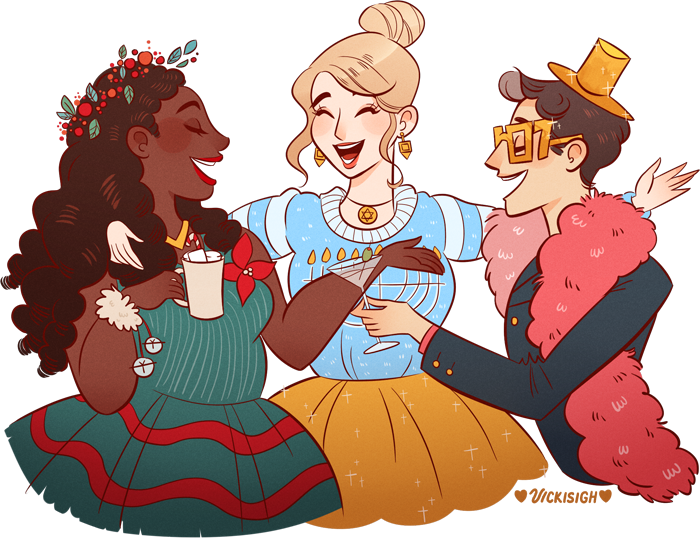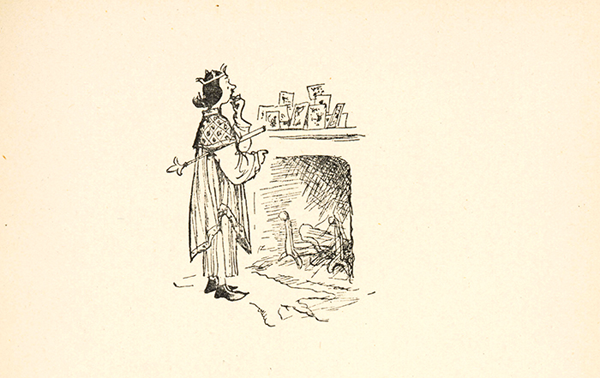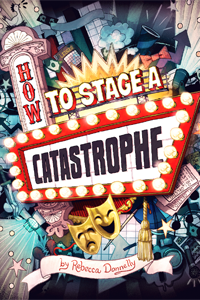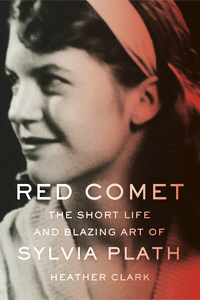
‘Tis The Season: Authors Talk Holidays is a special seasonal feature on Pop! Goes The Reader in which some of my favourite authors help me to celebrate the spirit of the season and spread a little holiday cheer. So, pour yourself a cup of hot chocolate and snuggle in by the fireside as they answer the question: “What does the holiday season mean to you?” You can find a complete list of the participants and their scheduled guest post dates Here!


About Rebecca Donnelly
Rebecca Donnelly was born in England and has lived in California, Florida, and New Mexico. She has an MA in Humanities and a Master’s in Library and Information Science. These days she writes and runs a small rural library in upstate New York. Her debut middle grade novel, How To Stage A Catastrophe, the story of a children’s theater in the Florida panhandle, will be published by Capstone Young Readers in April 2017.
King John’s Christmas
When I was seven, my mother and brother and I moved in with my grandparents, so my grandmother features as heavily in my memories of childhood as anyone, heavier, perhaps, because I stuck to her like lint. My grandmother, who would have been 96 today, was the one who started the December custom of reading A.A. Milne’s poem “King John’s Christmas” from his book Now We Are Six. It begins this way:
King John was not a good man —
He had his little ways.
And sometimes no one spoke to him
For days and days and days.
(As an aside, this opening stanza might be where I get my unrepentant love of the em dash.)
This King John, if you don’t know, is the King John who was forced to sign Magna Carta to guarantee certain rights to a group of barons. He was quite unpopular, but in my mind, because of how I read him in this poem, he was always a pitiable figure. Later, Milne gets inside John’s mind a bit: What does an unpopular monarch really want for Christmas?
“I want some crackers
And I want some candy;
I think a box of chocolates
Would come in handy;
I don’t mind oranges,
I do like nuts!
And I SHOULD like a pocket-knife
That really cuts.
And, oh! Father Christmas, if you love me at all,
Bring me a big, red india-rubber ball!”
He goes back and forth on this issue, leaving messages on his rooftop for F. Christmas to say what he wants, denying that he really needs a pocket-knife, then pouting when he doesn’t get one. Bad King John, in other words, is a sulky child with authoritarian tendencies who just wants some attention.
What I loved about this poem as a child — what I still love — is its highly accessible and enjoyable satire of a powerful person. Milne, creator of Winnie-the-Pooh and that lovable grump Eeyore, knew something that some satirists today are still having trouble figuring out: Punch up. Satirize the wealthy, the powerful — the dead, especially if they were both wealthy and powerful. Use satire as a lens to magnify the foolishness that lurks within all humans, regardless of status. Show us, then, the dangers of some kinds of foolishness.
I know you’re wondering, But what about the india-rubber ball? Does he get it in the end? You may be gratified, or disappointed, depending on your feelings about sulky kings, to know that he did.
Through the window, big and red,
There hurtled by his royal head,
And bounced and fell upon the bed
An india-rubber ball!AND OH, FATHER CHRISTMAS,
MY BLESSINGS ON YOU FALL
FOR BRINGING HIM
A BIG, RED,
INDIA-RUBBER
BALL!
Now We Are Six was published in 1927, in between two world wars. If it had been written a few years later, when fascism was spreading throughout Europe and war was on the horizon, would Milne have been as sympathetic to Bad King John? If his original intention was to subvert a bit of British history for schoolchildren and give them a reason to laugh at someone who had perhaps only seemed dead and dull, would political reality have compelled him to send a sterner message instead? A warning?
“King John’s Christmas” is a holiday tradition for me. I read it every Christmas Eve to my own children. This year, it also stands as a reminder to me that writing, even writing things that seem silly and light, is a political act. Our subjects, our words, our points of view, are inherently political in that they support or challenge the status quo. The best kind of writing, whether intentionally political or not, can carry a theme that has meaning in 1927, in 1939, in 2016.
In Milne’s poem, John is reduced to a caricature, but a somewhat sympathetic one. Worthy of satire but not without some humanity. If I were writing “King John’s Christmas” in 2016, you can bet King John wouldn’t have any bouncy ball coming in through the window as if he were a child, needing a scolding but still loved. I’m not sure what the 2016 version would be. I’m not sure I’m a seasoned enough satirist to get it right. So I’ll leave it at this:
A message to all readers this holiday season: I hope your stockings (or if you don’t hang stockings, your lives) are full of books, crackers, candy, boxes of chocolates, oranges, nuts, and even pocket-knives, if you don’t have one that really cuts.
To all writers: I hope your stockings are full of insight, bravery, eloquence, clarity, and power (and, yes, a box of chocolates would come in handy, too). 2017 is coming. We’re going to need everything you’ve got.



Title How To Stage A Catastrophe
Author Rebecca Donnelly
Pages 258 Pages
Intended Target Audience Middle Grade
Genre & Keywords Contemporary, Realistic Fiction
To Be Published April 1st, 2017 by Capstone Young Readers
Find It On Goodreads ● Amazon.com ● Chapters ● The Book Depository
Sidney Camazzola plans to be the director of the Juicebox Theater when he grows up. For now, he handles the props, his best friend Folly works the concession stand, and his sister May hangs out in the spotlight. But the theater is in danger of closing, and the kids know they need a plan to save it — and fast. When they join a local commerce club to earn money, Sid and Folly uncover some immoral business practices, and it gives them a great idea for saving the theater. That is, if you can call extortion a great idea. Their crazy scheme is the production Sid was born to direct. But can they pull it off?












